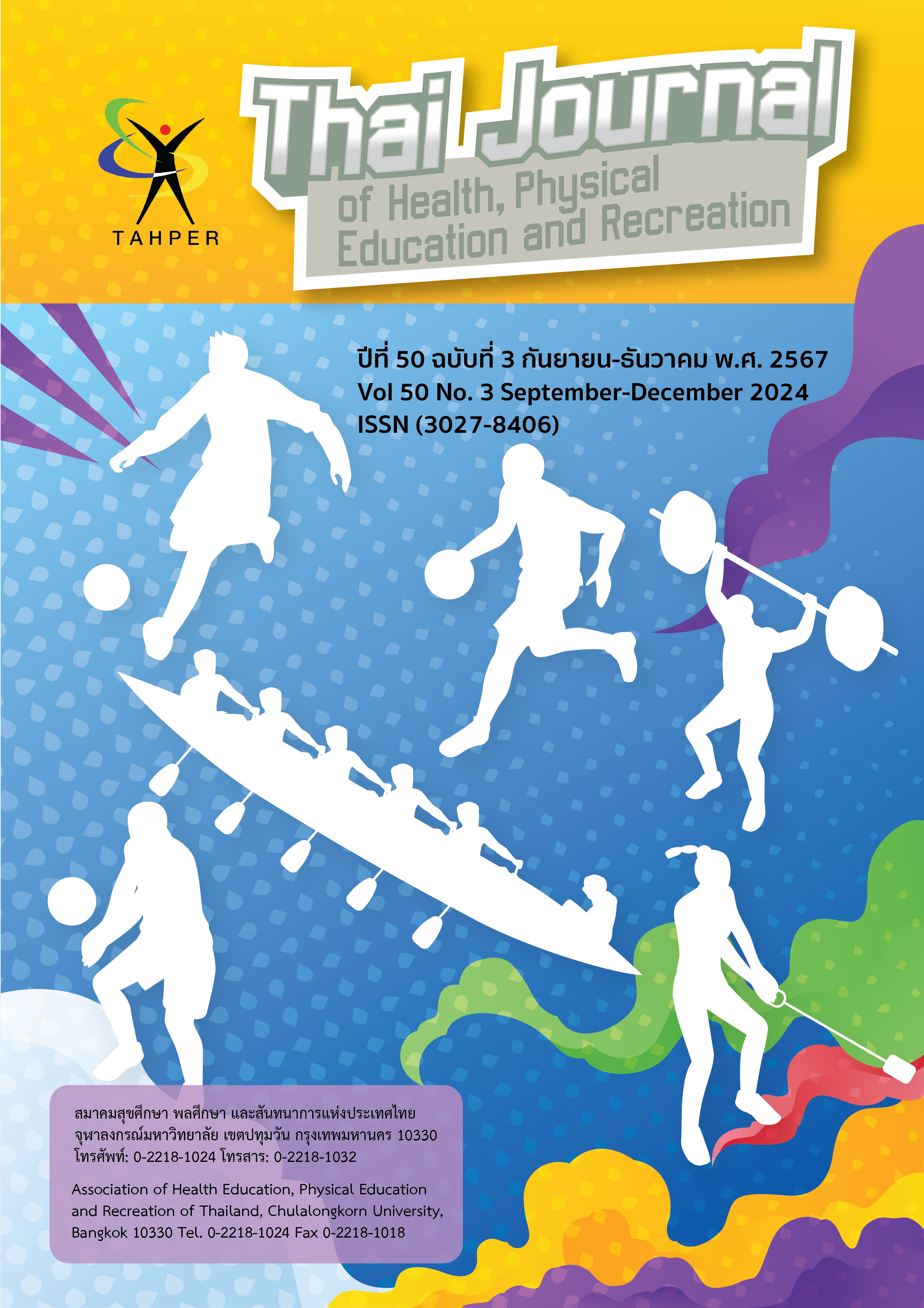The framework for promoting health knowledge among overweight working-age individuals in Sai Mai District, Bangkok Province
Main Article Content
Abstract
This study was survey research with the following objectives: 1. To examine factors that influenced the health knowledge of the population in Sai Mai district, Bangkok, Thailand. 2. To explore factors that influenced obesity among individuals aged 25 years and older in Sai Mai district, Bangkok, Thailand. Additionally, the study aimed to gather in-depth data from stakeholders to develop a model for promoting health knowledge among the working-age population affected by obesity in the aforementioned district. The sample consisted of 200 individuals selected through purposive sampling, from whom complete data were obtained from 182 respondents, representing a response rate of 91.00%. Data collection took place between December 2566 and January 2567, utilizing a questionnaire with a Cronbach’s alpha reliability coefficient of 0.9411. Statistical analyses included frequency distributions, percentages, means, standard deviations, medians, ranges, Pearson's correlation, logistic regression, and multivariate analysis of variance.
The findings of the research were as follows: 1. The majority of the population in Sai Mai District, Bangkok Province, possessed basic health knowledge on certain topics, enabling them to moderately adapt health behaviors. 2. Marital status, education, occupation, income, sources of health information from print media/radio/television, community outreach programs, online platforms (Line/Facebook/Internet), utilization of social security health benefits, and utilization of government employee health benefits significantly influenced health knowledge among the population in Sai Mai District, Bangkok Province, at a statistically significant level of 0.05. 3. The most significant predictors of normal weight or obesity among individuals aged 25 and above in Sai Mai District, Bangkok Province, were utilization of community welfare fund health benefits, with an odds ratio of 1.213, followed by gender, with an odds ratio of 0.976, and utilization of gold card health benefits, with an odds ratio of -0.359.
Article Details

This work is licensed under a Creative Commons Attribution-NonCommercial-NoDerivatives 4.0 International License.
Critical thinking in journals is the right of the author. The Association of Health Education, Physical Education and Recreation of Thailand is not always required, to create diversity in ideas and creativity.
ความคิด ข้อวิพากษ์ในวารสารเป้นสิทธิของผู้เขียน สมาคมสุขศึกษา พลศึกษา และสันทนาการแห่งประเทศไทยไม่จำเป็นต้องเห็นชอบด้วยเสมอไป เพื่อให้เกิดความหลากหลายในความคิดและความสร้างสรรค์
References
Chiangkhong, A. (2018). The results of health literacy development through learning management for change towards Blood glucose control behavior of diabetic patients. [Unpublished doctoral dissertation]. Srinakharinwirot University. (in Thai)
Division of Health Education. (2011). Health Quotient. Bangkok: New Normal Printing (Thailand) Co.,Ltd.
Ekpalakorn W, editor. Report of the Thai people’s health survey by 5th physical examination, 2014. Nonthaburi: Public Health Systems Research Institute; 2014. (in Thai).
Hfocus.Thai people die with NCD disease 37 people per hour [internet]. 2018 [cited 2019 Jan 19]. Available from: https://www.hfocus.org/content/2018/08/16157. (in Thai)
Khawthong, T. (2011). Searching and Assessment of Health Information Sources on the Web, Information Science Journal, 29(3), 31-41. (in Thai)
Kijworapat, W. (2010) Development of a weight control program for working women with overnutrition. Journal of Health Education. (in Thai)
Kwanmuang Kaewdumkerng. (2021). Health Literacy: Process, Practice, Assessment Tool. Bangkok: Amarin Printing and Publishing Public Company Limited.
Manganello J. A. (2008). Health literacy and adolescents: a framework and agenda for future research. Health education research, 23(5), 840-847.
Nutbeam, D. (2000). Health literacy as a public health goal: a challenge for contemporary health education and communication strategies into the 21st century. Health Promotion International, 15(3), 259-267.
Pengchan, W. (2017). Knowledge of health. In the capacity development workshop document Personnel of the Department of Health-on-health knowledge towards Thailand, Department of Health, Ministry of Public Health. Nonthaburi: Ministry of Public Health. (in Thai)
World Health Organization. Cardiovascular diseases [internet]. 2017 Available from: https://www.who.int/en/news-room/fact-heets/detail/cardiovascular-diseases-(cvds).


